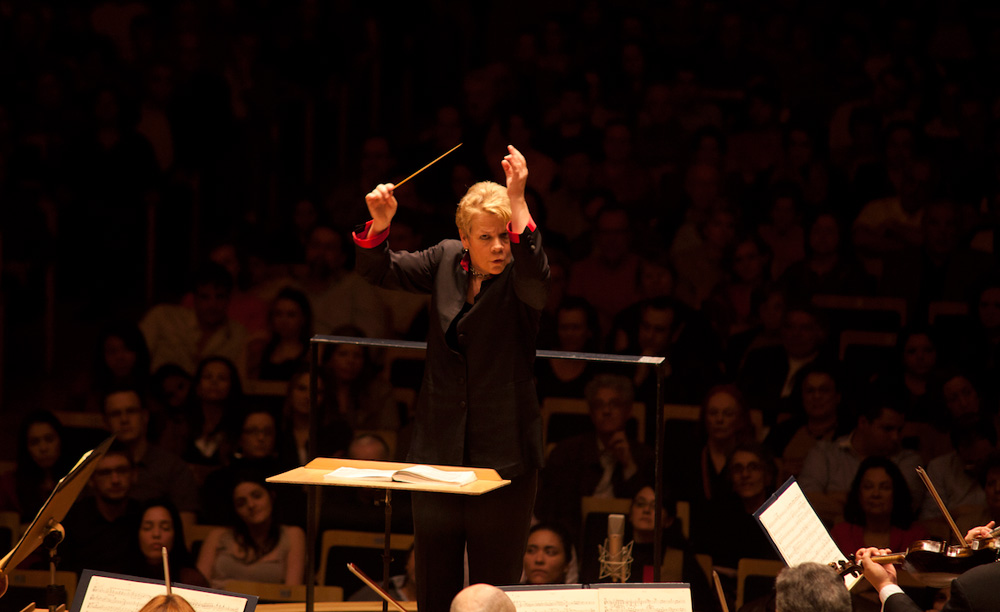In “The Conductor,” it’s revealed that it was once assumed that Marin Alsop would be a pianist, so she could form a trio with her mother Ruth, a cellist, and her father LaMar, a violinist, to tour as a family, a gimmick perhaps, but one that would better the odds of making a steady income in the unforgiving profession of music. Alsop had other ideas, and would enlist in a violin camp that would lead to having to put herself through college when her parents wouldn’t support it and forming her own classical trio, String Fever, that would reinterpret rock music. As Bernadette Wegenstein beautifully conveys in her profile of the woman who would come to play all the instruments — or at least the musicians playing them — as the music director for the Baltimore Symphony Orchestra, it might’ve been a lonely path for Alsop, but one that made her uniquely suited to be the first in charge of a major orchestra in the world.
If Alsop is attuned to every movement of her string section or the pounding of the drums to create harmony, Wegenstein matches her note for note in “The Conductor,” envisioning all the elements of an eventful life adding up to someone who has defied the odds and carved out a place for herself at the podium where none was available to her. The film is introduced with the Russian conductor Yuri Temirkanov, her predecessor in Baltimore, admitting to not really liking female conductors and in spite of being a protege to Leonard Bernstein, considered to be one of the greatest in the field, Alsop’s ascension was constantly questioned and told straight up at 23 she would never lead an orchestra. “The Conductor” is conscious of the fact that no woman has risen to the level that Alsop has since her appointment, though many around the world are in training, and while the film unravels a fascinating story around the unique set of circumstances paired with Alsop’s determination that led to her breaking through, Wegenstein shows a glass ceiling that’s ready to burst wide open.
Criss-crossing the globe from Austria to Brazil to the U.S. where Alsop is now highly in demand, despite acknowledging she may soon be slowing down after such an accomplished career, the film offers as much as an escape as the music can in placing audiences in some of the best seats available in concert halls around the world and following the film’s travels since its premiere last year at the Tribeca Film Festival, Wegenstein graciously took the time on the eve of the release of “The Conductor” to talk about how she thought about filmmaking in a musical context to bring Alsop’s story to the screen, reflecting on a life with a subject who doesn’t like to look back and how the film is connecting with audiences of all different kinds of backgrounds.
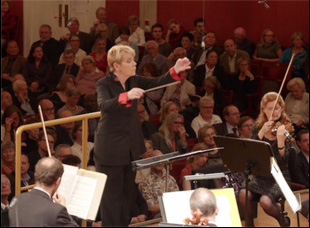
Yeah, I moved to Baltimore to work at Johns Hopkins, but a documentarian is always alert and sees what’s around them. I made a couple of films that were Baltimore-based, but the one about Marin really was meant to be because it came to me from two different angles. One was Johns Hopkins itself, because Marin is associated with as a professor of the Peabody Institute, which is part of Hopkins. But then there’s also the factor that the [Baltimore Symphony Orchestra] is a local symphony and when I moved here, people would say to me, “Oh, you’re from Vienna so you like classical music.” I would say, “Not necessarily,” because classical music wasn’t something that I was looking for in American. I was an immigrant, so I was looking for all sorts of other inspirations, but in my case, actually I do [like classical], so they would recommend that I go see the BSO and it really connected me in a way with my childhood, and I felt the music very deeply under my skin.
Then I saw this woman there and said, “Hey, why is she a woman?” – a very problematic question that I asked myself [because it was so rare], especially as a feminist scholar. The next thing I knew she was actually reaching out to me, which was a really an incredible coincidence because she wanted to see if there was a filmmaker at Hopkins interested in the forgotten history of some older generation conductors and I developed a storyline around Sylvia Caduff, [who] only made it to the very last moment in the end credits [of “The Conductor”] because I decided once I started shadowing Marin and really understanding what the art of conducting was and what it meant to have become a woman conductor, the story needed to be about Marin.
I also didn’t want to dilute this story in a classic, almost counterproductive feminist way when you have five women and they have to now compete against one another and the viewer has to decide which diverse or non-mainstream person is the best. I don’t like that kind of storytelling, and I also thought there was so much to Marin’s story that she really could carry the whole film. Through her, audiences can look for other women conductors that indeed have been left out of this canon. She’s not the only one, and there’s even very interesting history in Austria — for instance, Mahler’s wife was an incredible composer as well, but she wasn’t able to compose, or allowed to. But this was the story of Marin.
I’ve heard you actually underwent musical training so you could better understand her as a subject. What went into the preproduction of this?
The first thing I did that year I really developed the project and researched it was to ask Marin, “can I take your graduate class for conducting?” I sat in that class and took notes, but two weeks in or so, I realized, this is not going to work because I need to learn to read the scores because I’m not sure how I can follow them. I can read music [because] my grandparents were classically trained musicians in Vienna, and my grandfather was an opera singer, but it was under the Nazi regime, so he was busy hiding. And I learned the piano, like every other person, but that didn’t qualify me to really follow a graduate class in conducting.
I reached out to Alexa, a PhD student in composition, and we studied all the scores that are now in the film — Mahler’s first is of course the main piece that is woven in, but “Mass,” which we have a big scene of, and then of course “The Zauberflöte,” “The Magic Flute.” Once I decided to also incorporate Rimsky-Korsakov, I went to the romantics, so I spent really a year with her every week, and [now] I’m developing a new film and I already hired Alexa and I’m working now through the history of musicals with her. It was really my favorite part of making this film, connecting to the music and approaching feeling it the way that an actual professional musician does, but then translating it into different medium.
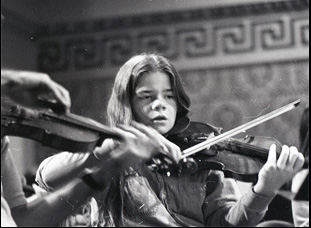
Yes, and like so many Austrians, Stefan [Fauland] grew up in the countryside and there’s a lot of music in the folklore of Austria. His father was a choir instructor, so it was just a really amazing thing to be working with someone who then was able to almost surgically really take this music apart and weave it around the way that I wanted it to communicate with each scene. We we went as far as to sometimes connect the level of Marin’s voice to the actual beginning of which phrase we were using musically. We went deeper and deeper and I loved that process. And I didn’t really know where it was going to take me, but in the end, I think it really worked. It was an experiment to a certain extent, but it was very pleasurable.
I think filming storytelling is all about rhythm, right? And documentary is difficult because you have to really overpower everything with the rhythm that you are setting. If I’m directing an actor, I can already instill the rhythm in them. But in the case of a documentary that wants to also be real, then the rhythm has to come in from the pacing and from the way that the story’s actually structured. So at the very beginning, I told Stefan, I don’t want to make a film where I’m saying to people, “Oh, is she going to make it?” Because this is not to entertain people with a person’s suffering and with their setbacks. I’d like to send them on their way so that they can empathize and can be with them and that’s why we decided to really show her from the very beginning as the star that she is.
Then [it was] the idea of taking two steps forward, one step back in the narrative weaving together of the story, [which] came from a discussion I had with the editor. We really wrote it together about the fact that when you’re marginalized in a field because of your gender or sexual orientation or skin color, even if you make it, the norm is always coming back at you and testing you. The mainstream is not something that is very forgiving, so all you’ll be is reminded that you were not meant to be where you are. And what does that mean? You have to be better than others already because of this expectation, but also you’ll always have to step backwards because you can’t forget what happened.
That is really why we structured it this way. I wanted her to really succeed. Maybe at 45 minutes, she becomes the first woman to ever conduct a symphony. And then the [rejection] letter comes in, and I wanted her to be sharing her disappointment that at that level of her career, she was still having to go through this. The second part of the film is more giving back and helping others and mentoring, and seeing maybe their setbacks, so we structured it to be true to the marginalized identity experience.
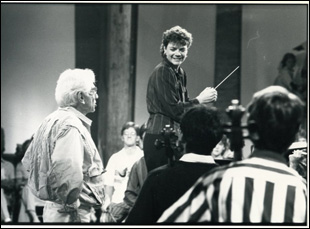
No, she doesn’t like to look back. [laughs] In fact, she told me at the very beginning [when I asked] how are you so successful? She said, “Because I only touch everything once, and then I go forward if it doesn’t work.” But it’s like a relationship with any person that you’ve ever had. You know when it’s a good moment to bring up something that might be critical of them, and I was very aware that there were vulnerable moments, and those were the moments that I left my crew outside [and would say] I just want to talk to you personally about this. [In] the one interview where she’s really emotional in her office that weaves itself through the whole film, she told me 10 minutes before, “Hey, you can come in, I’m open. I’m going to tell you something tonight.” And I’m like, “What about lighting and everything?” So the scene doesn’t look as good as I wanted it to, but what she says is profound, and the reason she opened up that day was because she was doing [Beethoven’s] Eroica.
The BSO [told me] last minute, “No, you all can’t come,” and Shana [Hagen], my DP from Los Angeles was in town and it was a big setback for me. I was disappointed and [Marin] said, “You know what? Why don’t you wait for me when everything’s over, you can sneak in into my office and then maybe today is the day that I want to share some things with you. so we were standing by, and I didn’t get the Eroica, but I got to her heart that night, because when something unjust happens, she reacts very strongly. She thought we the crew weren’t treated nicely and this led to this really profound interview. I love people of all kinds, but the more complex they are or the more I can’t see through them, the better I think they are for the screen because the screen is a place where the truth comes through in other ways. And I think she’s a great screen person for that reason. But she is guarded, and at times she would say no.
At the beginning when we started, I found all these articles from journalists like yourself about all these scandals about her hiring and this and that, and [when I asked], she said, I’m not talking about that. It wasn’t until a year-and-a-half later that we did talk about it, but I never pushed her, because documentary works in many ways [as] journalism, except the one big difference is that there’s no time constraint in the same way, so the luxury is that I could wait.
Did anything happen that changed your ideas of what this could be?
One thing that I think I didn’t expect is that I wanted to educate the viewer a little bit about the music itself. I would’ve not thought that I was going to go to the mountains to film animals and sceneries that Mahler might’ve encountered as a child, and I grew up in Vienna, I knew Mahler, so I thought. But I knew nothing about it until [Marin] explained it to me and until Alexa explained it to me, and until I saw how the Jewish songs and the Austrian folklore is all woven into the fabric of this music. That’s when I thought, I got to go to the places in a way that inspired him because I want us to breath that air. When I put Marin on a boat, she said to me, “I haven’t been on a boat in 20 years.” And I said, “No, but you’ve got to be on this boat on the lake, because otherwise I can’t go to the mountains.” So she played along with that, and she appreciated my curiosity. And Mahler also is an outsider, not because only of being Jewish, of course, but also in the way that he composed, so that really was something that surprised me, how close I got to this particular composer, making the film.
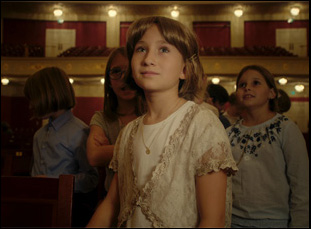
I gave an interview at a Korean film festival where the critic interviewing me didn’t reveal their name and sent me these secret questions about gender and music identity. I was so touched by those questions. Between that, and then all the Jewish film festivals, I’m just very surprised about this and very honored and very happy. But I didn’t think one moment while I was in the editing room or while I was learning [to read music] with Alexa or on the mountain with Mahler’s goats, “Oh, this is going to reach all these people.” I think filmmaking is such an intimate process and you connect very intimately to your own feelings, and perhaps even childhood as in this case. The fact that this now traveled to all these people for different reasons and interests, it couldn’t make me happier. When you create something, it’s not even the ego, but you want to share your point of view with the world and to be understood in your intentions. Like Marin talks about connection through music, and connecting with you or with anybody I’ve talked to is very gratifying. I think [the film] speaks to people because there are so many different marginal experiences and you go on the journey also willingly because Marin is such a strong character, so you’re safe listening to her. I think there’s that, too.
“The Conductor” will open on January 27th in New York at the Quad Cinema, where Wegenstein and Alsop will appear for a Q & A after the 1/27 7 pm screening, and on January 28th in Baltimore at the Charles and on February 4th in Los Angeles at the Laemmle Royal. A full list of theaters and cities is here.




